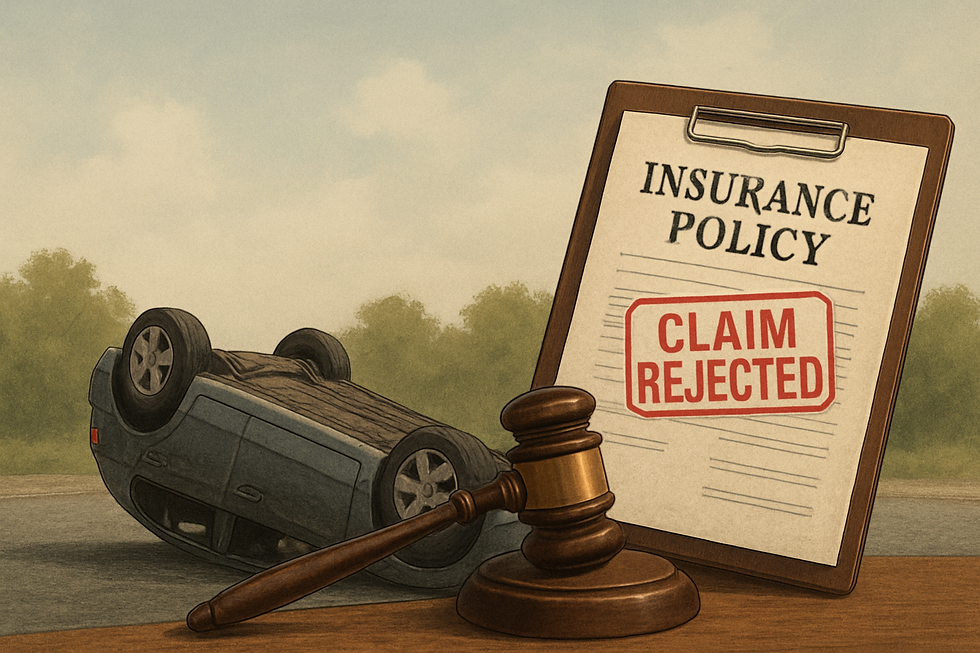Motor Vehicle Act Does Not Grant Compensation to Legal Heirs of Negligent Driver, Says Supreme Court
- Lawttorney.ai

- Aug 6, 2025
- 4 min read
Case Title: G. Nagarathna And Others Versus G. Manjunatha And Another
Bench: Justice PS Narasimha and Justice R Mahadevan.
In the recent judgement delivered by the Supreme Court on 2nd July, It was again clarified by the Court that the legal heirs of a person who dies due to its own negligence will not be eligible to claim compensation under the MVA, 1988.
The case, G. Nagarathna & Others Versus G. Manjunatha & Another, arose from tragic circumstances, but the legal question it addressed was significant and far-reaching: Does the law support compensating a family when the deceased driver was solely responsible for the accident?
In this Case, The Supreme Court recently held in road accident cases, the insurance companies are not liable to pay any compensation to the legal heirs of a deceased person who caused the accident by his rash and negligent driving.

Understanding the Law: Motor Vehicle Act in Brief
The Motor Vehicle Act governs road usage in India. It ensures road safety, sets rules for insurance, driver licenses, vehicle registration, and outlines penalties for traffic violations and many things on the similar line. One of its key features is compensation for accident victims but not every accident qualifies.
This judgment sets a clear boundary: If the driver is at fault, their family cannot claim compensation under Section 166 of the Act.
Factual Background: A Fatal Accident Caused by the Deceased
The case concerns N.S. Ravisha, who died in a road accident while driving a Fiat Linea car recklessly and at high speed. Due to his own negligence, the car overturned, resulting in his death.
Subsequently, His wife, son, and parents had filed a claim for Rs 80 lakh in compensation with the Motor Accidents Claims Tribunal (MACT) in Arsikere in compliance with Section 166 of the Motor Vehicles Act. The Tribunal rejected the plea and declared Ravisha to be the wrongdoer, meaning that his own actions caused the accident. Citing his Rs 3 lakh monthly income and his position as the family's main provider, his wife, son, and parents submitted a claim for Rs 80 lakh in compensation. United India Insurance Co. Ltd. was the target of the claim.
The Motor Accident Claims Tribunal dismissed the claim, ruling that he was not a "victim" under the Motor Vehicles Act because he was a "self-torteasor," which is defined as someone who is accountable for their own harm or death.
Karnataka High Court: Upholding Legal Precedents
The Karnataka High Court upheld the tribunal's rejection and backed its conclusion with a strong precedent: ‘Ningamma & Others v. United India Insurance Co. Ltd. (2009) 13 SCC 710.’
"Since the accident resulted from the deceased’s reckless and negligent driving, making him the tortfeasor, his legal heirs cannot seek compensation for his death; otherwise, it would be equivalent to the wrongdoer receiving compensation for his own misdeeds."
A Key Arguments - He Was Just a Borrower:
The appellants contended that the insurance company should still be held accountable because Ravisha was only the borrower and not the owner of the car. But the high court also dismissed this argument.
The Court clarified, citing a previous ruling in Mehta v. Balkrishna Nayan, (1977) 2 SCC 441: “When the deceased borrows a vehicle from its owner, he effectively takes the place of the owner. Therefore, any negligence on his part while driving the vehicle makes him liable as if he himself were the owner.” Subsequently, the appellants filed their case with the High Court.
Another Citing the Supreme Court's decision in Ningamma and another Vs. In United India Insurance Co. Ltd., (2009) 13 SCC 710, the High Court determined that since "the accident resulted from the reckless and negligent driving of the deceased himself, and he being a self tort-feasor, the legal heirs are unable to seek compensation for his death, as it would equate to a person who committed a breach receiving compensation for their own misdeeds."
The Appellants argued that the deceased did not own the vehicle involved in the accident; thus, the insurance company cannot evade its responsibility to compensate the deceased for the loss incurred
Final Word: No Compensation for Self-Caused Harm
In its concluding statement, the Supreme Court strongly maintained the Karnataka High Court's ruling, stating that legal heirs are not entitled to compensation when the dead's own negligence caused the accident, regardless of whether the deceased owned or merely rented the vehicle.
The Court stated that compelling the insurer to pay under such circumstances would be permitting a person to profit from their own wrongful act, which violates the principles of fairness and tort law. The jury ruled: "The claim was rightly dismissed, as awarding compensation in such cases would mean allowing a person to benefit from his own wrongdoing."
This ruling reinforces a key legal doctrine: accountability and compensation cannot coexist in cases where the wrongdoer and the victim are the same person.
Empower Your Legal Practice with AI – Join Our Free Webinar!
Are you a legal professional looking to boost your efficiency and stay ahead in a competitive field? Discover the power of Lawttorney.AI – the cutting-edge tool designed to streamline legal research, automate tasks, and enhance productivity.
👉 Don't miss out! Reserve your spot in our FREE webinar and experience the future of legal practice today. Register Now



Comments